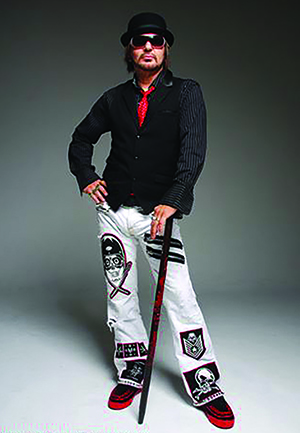Oral Cancer Survivor
Clinical Trial Exceeds Rocker’s Expectations

Professional musician and father of two, Rikki Rockett was healthy for most of his life. Then he heard the words, "you have cancer". After receiving a diagnosis of Stage IV squamous cell carcinoma at age 54, he surrounded himself with a team of experts committed to curing his disease. Several months into an immunotherapy clinical trial, he continues to make outstanding progress, and he encourages others to learn more about this exciting cancer treatment option.
In June 2015, a month-long sore throat and cold prompted Rikki Rockett, drummer of the American rock band Poison, to make multiple visits to an ear, nose and throat doctor. It took another month, a specialist, and several endoscopic tests and biopsies to learn the reason behind his illness. He had Stage IV squamous cell carcinoma caused by human papillomavirus (HPV).
“My doctor found a tumor at the base of my tongue, and cancer had spread to two lymph nodes. When I first heard the diagnosis, I drove my doctors, and everyone around me, crazy trying to get information. I learned that HPV is the number one leading cause of oral cancer today. Women can find out they have HPV infection when they have a Pap smear, but it’s much harder for men to know they have it. My doctor estimated I’d probably contracted HPV 15 or 20 years before my diagnosis, but there is no way to really tell.”
Right away, Rikki surrounded himself with a team. He had three doctors — one for chemotherapy, one for radiation therapy and a surgeon.
“My doctors were up front with me from the beginning. They warned me I had ‘one hell of a cancer,’ but they also said it was very treatable with chemotherapy, radiation therapy and surgery. I knew I wanted to beat it, so I went head first into it. I started with nine rounds of chemotherapy, and then I had 35 rounds of radiation therapy. Thankfully, I was able to avoid surgery.”
He also worked with a swallow/speech therapist and a physical trainer who also does rehab and nutrition. Sticking to a daily schedule with them proved invaluable to Rikki, both emotionally and physically.
“I needed to do something for myself and for my health every day. Otherwise, I was afraid I’d slip. I didn’t want to sit around and watch movies all day and wallow in my situation. Every day I would wake up, shower, dry my hair and dress decent. It gave me self-confidence. Watching myself lose all that weight was really tough, though.”
The 20-pound weight loss was just one of the side effects of Rikki’s treatments.
“I actually aced chemo and radiation therapy, compared to many people,” he said. “Yes, it was horrid. However, I never needed a feeding tube, and I never got burns on my neck. I had a mild case of thrush and an unrelated sinus infection. All the sores in the mouth and sore throat were certainly there.”
He received a great deal of support from fans, and his inner circle played a big role in his experience.
“My parents are gone. My sister is raising three children, so she wasn’t able to come be with me, but she called every day. My battle buddy, Cortni, was a huge help. And, I had a very special person who made me fight when I thought I couldn’t. She knows who she is, and I love her.”
After completing chemotherapy and radiation therapy, Rikki and his doctors hoped for good news at his follow-up exam. They were surprised and concerned when his PET results showed the cancer appeared to be back.
“I felt like I should have been getting better, not worse,” he said.
Rikki’s doctors recommended he try a two-year immunotherapy clinical trial. He admitted that taking a chance on immunotherapy was scary. He didn’t have a lot of information about it when he decided to start the trial, and it made him nervous. He was pleased that immunotherapy caused fewer side effects than his other treatments, and he felt much better physically during treatment.
After several months on the trial, test results declared he was cancer free.
"I've been one of the lucky people who has responded very well to immunotherapy, and I hope others will give it a try.”
Along with being a big proponent of immunotherapy, Rikki feels strongly that staying positive means taking action.
“It isn’t just a switch you can turn off and on. Get up, go places even when you think you can’t, and try to look your best. And, be there for another person going through what you’re going through.”


